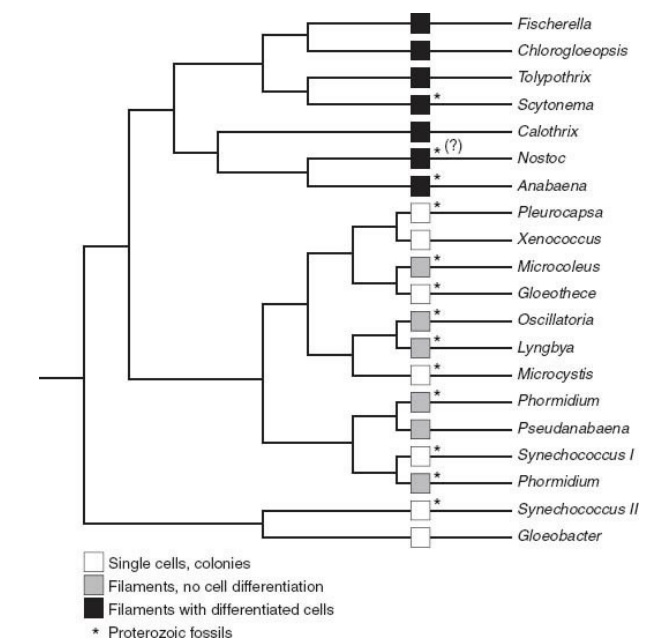Mutation rate in cyanobacteria
https://reasonandscience.catsboard.com/t2707-mutation-rate-in-cyanobacteria
Data and annotations in CyanoBase (September 2009)
The database contains the entire 3,9mb (3.900,000 nucleotide) genome sequence of Synechocystis sp. PCC 6803 1 That is the size of an average Cyanobacteria genome, their genome hosts 3,9 million base pairs
Within the cyanobacterium life cycle, cyanobacteria undergo cell division approximately once per day under the influence of moderate constant light and through intensifying the light, the cells start dividing more frequently as more energy is available. It takes about 19 hours for the cyanobacteria to rest before it can process cell division once more. 2
Bacterial DNA Mutations 3
Spontaneous mutations occur at a rate of 1 in 10^5 to 10^8 and contribute to random population variation.
that is, if we suppose the lowest mutation ration, one mutation in every 100 mio base pairs 100.000.000, in other words, 1 mutation per 50 cell cycles.
If the first fully developed cyanobacteria emerged 3,7 billion years ago, and they replicate once per day, that means, there were 3.700.000.000 years x 360 days = 1,332^12 replication cycles. Now let's divide this with 50 since there was 1 mutation per 50 cycles, which means, there would have had to be 2,664^10 mutations during this time period.
Since the genome size is 3,9 mio base pairs, we divide 2,664^10 mutations : 3,9 million Bp = 6830
That means, they would have changed their genome 100%, 6830 times
Now it becomes more complicated. We would have to know some factors, like population size etc, to calculate the fixation rate of mutations:
https://en.wikipedia.org/wiki/Fixation_(population_genetics)
The point here is, IMHO: How is it that Cyanobacteria became the first organisms on earth, nitrogen fixation, circadian clocks, complex advanced eyes, ATP synthase nano turbines that generate energy in the form of ATP, rubisco that fix carbon dioxide, and then suddenly remained changeless for billions of years?
Cyanobacterias, amazing evidence of design
https://reasonandscience.catsboard.com/t1551-cyanobacteria-amazing-evidence-of-design
The history suggested by Proterozoic fossils is that cyanobacteria evolved early and quickly, and then just sat there, changing little over the eons. Many features of cyanobacterial biology are conserved across the entire phylum and so must already have been present when blue-greens began to diversify. Why should fossils from a 1.5-billionyear-old tidal flat look just like the cells observed in coastal mats today? The paleontological observation of long-term cyanobacterial stasis is particularly puzzling because we know that bacteria can evolve rapidly.
1. https://www.ncbi.nlm.nih.gov/pmc/articles/PMC2808859/
2. http://cyano-bacteria.blogspot.com/2012/04/life-cycles-and-reproduction_23.html
3. https://www.ncbi.nlm.nih.gov/books/NBK459274/

A tree showing evolutionary relationships among living cyanobacteria. Note that cyanobacteria with specialized cells fall on a fairly late branch of the tree. This means that fossils showing cell differentiation can place an upper bound on when the tree’s major branches formed.
https://reasonandscience.catsboard.com/t2707-mutation-rate-in-cyanobacteria
Data and annotations in CyanoBase (September 2009)
The database contains the entire 3,9mb (3.900,000 nucleotide) genome sequence of Synechocystis sp. PCC 6803 1 That is the size of an average Cyanobacteria genome, their genome hosts 3,9 million base pairs
Within the cyanobacterium life cycle, cyanobacteria undergo cell division approximately once per day under the influence of moderate constant light and through intensifying the light, the cells start dividing more frequently as more energy is available. It takes about 19 hours for the cyanobacteria to rest before it can process cell division once more. 2
Bacterial DNA Mutations 3
Spontaneous mutations occur at a rate of 1 in 10^5 to 10^8 and contribute to random population variation.
that is, if we suppose the lowest mutation ration, one mutation in every 100 mio base pairs 100.000.000, in other words, 1 mutation per 50 cell cycles.
If the first fully developed cyanobacteria emerged 3,7 billion years ago, and they replicate once per day, that means, there were 3.700.000.000 years x 360 days = 1,332^12 replication cycles. Now let's divide this with 50 since there was 1 mutation per 50 cycles, which means, there would have had to be 2,664^10 mutations during this time period.
Since the genome size is 3,9 mio base pairs, we divide 2,664^10 mutations : 3,9 million Bp = 6830
That means, they would have changed their genome 100%, 6830 times
Now it becomes more complicated. We would have to know some factors, like population size etc, to calculate the fixation rate of mutations:
https://en.wikipedia.org/wiki/Fixation_(population_genetics)
The point here is, IMHO: How is it that Cyanobacteria became the first organisms on earth, nitrogen fixation, circadian clocks, complex advanced eyes, ATP synthase nano turbines that generate energy in the form of ATP, rubisco that fix carbon dioxide, and then suddenly remained changeless for billions of years?
Cyanobacterias, amazing evidence of design
https://reasonandscience.catsboard.com/t1551-cyanobacteria-amazing-evidence-of-design
The history suggested by Proterozoic fossils is that cyanobacteria evolved early and quickly, and then just sat there, changing little over the eons. Many features of cyanobacterial biology are conserved across the entire phylum and so must already have been present when blue-greens began to diversify. Why should fossils from a 1.5-billionyear-old tidal flat look just like the cells observed in coastal mats today? The paleontological observation of long-term cyanobacterial stasis is particularly puzzling because we know that bacteria can evolve rapidly.
1. https://www.ncbi.nlm.nih.gov/pmc/articles/PMC2808859/
2. http://cyano-bacteria.blogspot.com/2012/04/life-cycles-and-reproduction_23.html
3. https://www.ncbi.nlm.nih.gov/books/NBK459274/

A tree showing evolutionary relationships among living cyanobacteria. Note that cyanobacteria with specialized cells fall on a fairly late branch of the tree. This means that fossils showing cell differentiation can place an upper bound on when the tree’s major branches formed.


